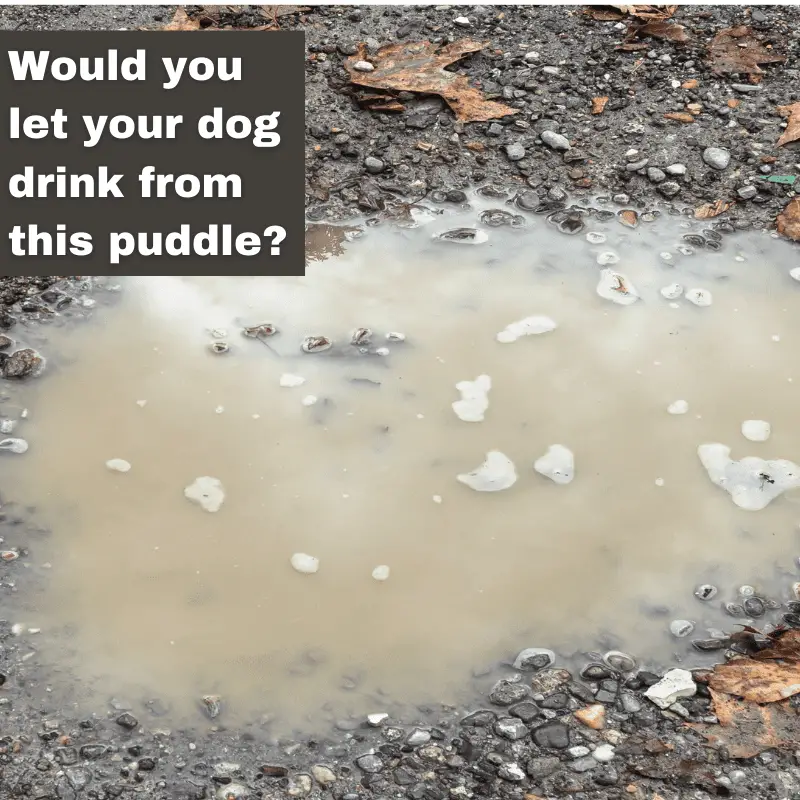When taking your dog on a walk, it’s a good idea to bring some snacks and water. Although dogs can drink untreated water from a lake, puddles on the sidewalk, or rain, doing so is not advised and may occasionally be harmful to their health. Read on and find out why.
The water from lakes or rainwater puddles, for instance, might not be the best for your pet, even though most animals can drink water from any source. Static water in the street or at home should also be handled carefully. These criteria are practically the same as those used to choose the water that people drink; we want to avoid contaminants, toxins, and germs that could lead to diarrhea and other health issues.
More on the risks of drinking rainwater
Dogs, like all animals, look for water to drink when they are thirsty, but when they are outside, this water may come from some unsanitary locations, such as puddles.
Although the water itself may be clean when it has just fallen, the ground where puddles collect is not, and it can remain dirty for hours or days depending on the weather.
Bacteria that live in contaminated water includes E. coli, Giardia and Campylobacter. Leptospirosis, a bacterium that can be found in water that other animals, like rats, have urinated in, can be acquired by your dog if it drinks from stagnant pools and puddles.
However, there is a vaccine available for your dog which is recommended, especially if your dog is a keen swimmer or insists on drinking rainwater from puddles or dirty water from stagnant ponds. This disease causes abdominal pain, diarrhea, and can also cause kidney failure in worse cases.
Other Dangers Found in Untreated Water
Another risk that dogs face when consuming untreated water is cyanobacteria, also known as blue-green algae. These are tiny bacteria that cause the surface of lakes to look like pea soup. Not all of them are toxic, but when they are, a pet can die from a few gulps of contaminated water. Freshwater lakes, streams, ponds, and brackish water ecosystems all contain blue-green algae.
It’s common to find antifreeze on the ground because it’s used to control the temperature of your car’s engine. Even though the water’s flavor and aroma are sweet, it is best to avoid drinking this mixture because on rainy days, the water can drag and stagnate, looking very alluring to a thirsty dog.
Dogs can consume poisonous antifreeze while also ingesting untreated water from a street puddle. A single sip could result in fatal kidney failure and irreversible kidney damage.
Dogs can drink untreated water, but doing so exposes them to a number of risks that are easily avoidable. So it’s best to bring bottled or filtered water from home to hydrate your dog while you’re out and about.
How the vet will treat your dog
Based on the results of the stool sample, the veterinarian will determine how to treat your dog. The majority of common finds will be parasites, and they will be treated with an antibiotic regimen or a deworming medication.
You put your health and the health of your family at risk by letting your dog drink rainwater. Although it may sound extreme, it is highly likely that if your dog has consumed contaminated rainwater, they will transmit it to anyone they come into contact with. Because I frequently kiss my dogs and let them lick my face, you should exercise extra caution. Avoid letting your dog drink any rainwater they find outside, including water found on the ground, in buckets, containers, lakes, rivers, and streams. All outdoor drinking from unidentified sources should be avoided.

By giving your dog water from a bottle or a bowl while out for a walk, you can prevent them from drinking from puddles. Use the command “leave it” firmly if your dog approaches a rainwater source with the intention of drinking.
If your dog isn’t accustomed to the “leave it” command, I’ve provided a straightforward training manual that you can access here.